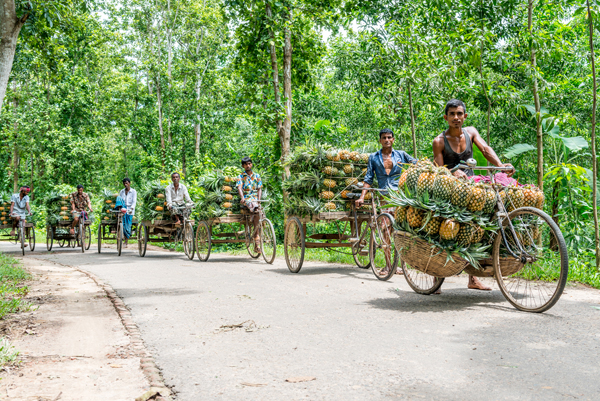
Public transportation in Dhaka is a vibrant and bustling system that is as diverse as the city itself. The city is served by a variety of public transportation options including buses, auto-rickshaws, cycle rickshaws, taxis, and the newly introduced Dhaka Metro Rail. Each of these systems offers a unique way to navigate the city and experience the local culture. Whether you’re an expat living in Dhaka or a visitor exploring the city, you can comfortably rely on these public transportation systems and walking to get around. However, it’s worth noting that the city’s traffic can be quite chaotic, and the public transportation system, while extensive, can be overwhelming for newcomers.
Buses
Buses are the most common form of public transportation in Dhaka. The city has a vast network of bus routes that cover almost every part of the city. The buses are run by both government and private operators, with the Bangladesh Road Transport Corporation (BRTC) being the main government operator. The buses are usually crowded, especially during peak hours, and can be a bit chaotic. However, they are also the cheapest form of transportation, with fares starting from as low as 10 Bangladeshi Taka (approximately 0.12 USD). While safety can be a concern, especially for women traveling alone, many buses now have separate sections for women to address this issue.
Auto-rickshaws and Cycle Rickshaws
Auto-rickshaws, locally known as CNGs due to their use of compressed natural gas, and cycle rickshaws are another popular form of transportation in Dhaka. They are ideal for short distances and navigating through the city’s narrow streets. The fares for these rickshaws are usually negotiated before the ride and can vary depending on the distance and time of day. While they offer a unique and local way to explore the city, they can be less safe than buses or taxis, especially at night.
Taxis
Taxis are a more comfortable and safer alternative to buses and rickshaws. They are metered, air-conditioned, and can be hailed from the street or booked through various mobile apps. The fares are higher than buses and rickshaws, but they offer a more convenient and hassle-free way to travel around the city. Taxis are a good option for women traveling alone or for those who prefer a more comfortable ride.
Dhaka Metro Rail
The Dhaka Metro Rail is the newest addition to the city’s public transportation system. The first line, known as the MRT Line-6, started operations in 2021 and runs from Uttara to Motijheel, covering a distance of 20.1 kilometers. The metro offers a fast, efficient, and comfortable way to travel across the city, bypassing the city’s notorious traffic jams. The fares are higher than buses but are still affordable, with prices ranging from 30 to 60 Bangladeshi Taka (approximately 0.35 to 0.70 USD). The metro is also considered safe for all passengers, including women and children.
In conclusion, while owning a car can provide more convenience and comfort, it is not a necessity in Dhaka. The city’s public transportation system, despite its challenges, is extensive and affordable, making it possible to live and navigate the city without a car. However, it’s important to be aware of the safety concerns and to take necessary precautions when using public transportation, especially for women traveling alone and during late hours.


